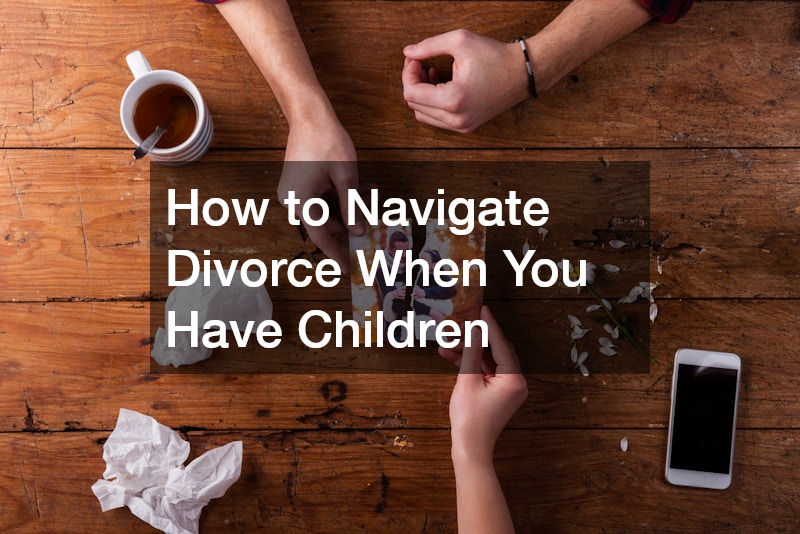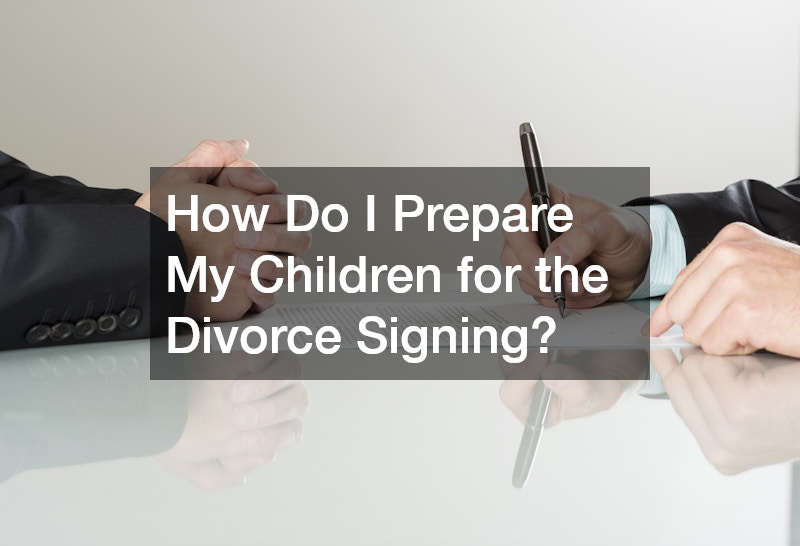How to Navigate Divorce When You Have Children


Divorce is a challenging process for any family, but when children are involved, the complexities grow exponentially. Navigating divorce while maintaining the emotional well-being of your children requires careful planning, legal insight, and open communication. From preparing your children for the changes ahead to handling co-parenting effectively, this guide aims to help you manage the difficulties while keeping your children’s needs at the forefront. Understanding how to address their concerns, work through custody arrangements, and seek professional support can make a significant difference in this emotionally charged journey.
1. How Do I Prepare My Children for the Divorce Signing?

Divorce is often accompanied by confusion, fear, and uncertainty, especially for children. It’s essential to prepare them for what is coming as you move toward finalizing the divorce. Many parents wonder how to approach the conversation and maintain their children’s sense of security during this challenging time.
1.1 Discussing Divorce Openly
One of the most important steps in preparing your children for the divorce signing is to discuss it openly. Children need to feel like they are being trusted with the truth, even if it’s difficult for them to hear. Arrange a time where you can sit down and calmly explain what divorce means, reassuring them that the decision is not their fault. Mention that you’ll be working closely with professionals, such as those at a divorce law office, to make the process as smooth as possible. Emphasize that both parents will remain active in their lives, helping them feel secure despite the coming changes.
1.2 Reassuring Your Children’s Stability
While discussing the divorce, it’s important to reassure your children that their day-to-day lives will not be upended. They need to know that despite the separation, both parents will continue to love and support them. Let them know that their home, school, and friends will remain consistent, and the routines they rely on will still be in place. By emphasizing stability, you can help ease their anxiety about the future.
1.3 Managing Emotional Reactions
Children will likely have emotional reactions to the news of divorce, ranging from confusion to anger. As parents, it’s crucial to manage these reactions with patience and understanding. Encourage your children to express their feelings openly, and reassure them that it’s okay to feel sad, scared, or even angry. Consider working with professionals like therapists or enrolling them in counseling therapy to provide additional emotional support during this transition.
2. What Legal Steps Should Be Considered for Child Custody?
The legal process of divorce becomes even more complex when children are involved, particularly regarding child custody. Making sure you understand the necessary legal steps and securing the right representation is crucial to ensuring the best outcome for your children.
2.1 Consulting with a Family Lawyer
When dealing with child custody, consulting with a family attorney is the first step toward ensuring that your children’s best interests are protected. A family lawyer will help you understand the legal implications of your decisions, explain your rights, and guide you through the custody process. They will also provide advice on the documentation required and how to present a strong case for your preferred custody arrangement.
2.2 Understanding Custody Types
There are different types of child custody, and it’s essential to understand each to make informed decisions. Physical custody refers to where the child will live, while legal custody pertains to decision-making authority over the child’s upbringing, including their education and health care. Parents can share custody (joint custody) or one parent may have sole custody. Knowing these distinctions is critical when discussing options with your family law attorneys.
2.3 Filing Custody Paperwork
Filing the necessary custody paperwork is one of the most important legal steps during divorce. Your family law attorneys will help you complete the forms accurately, ensuring they comply with the specific regulations in your jurisdiction. Filing these documents promptly and correctly can prevent delays and ensure that the custody process moves forward smoothly.
3. How Can I Minimize the Impact of Divorce on My Children?

Divorce can be a stressful and traumatic experience for children. However, with the right strategies, you can minimize the negative impact and help them adjust to their new reality with as little disruption as possible.
3.1 Maintaining Open Communication
One of the best ways to minimize the impact of divorce is to maintain open lines of communication with your children. Encourage them to ask questions and share their feelings about the divorce. Utilize services like divorce mediation to help facilitate these conversations, ensuring that your children feel heard and supported during this difficult time.
3.2 Establishing Routine and Stability
Children thrive on routine, so it’s vital to maintain consistency in their daily lives even as you go through the divorce process. Keep their schedules, such as school, extracurricular activities, and bedtimes, consistent to provide them with a sense of normalcy. A stable environment helps children adjust more easily to the changes.
3.3 Seeking Professional Support
To further help your children through the divorce, consider seeking professional support. Counseling therapy can provide them with a safe space to explore their feelings and learn coping mechanisms. Enlisting the help of professionals can ease the emotional burden on your children and give them tools to navigate the changes they are experiencing.
4. How to Communicate with a Co-Parent Effectively?
Effective communication with your co-parent is key to ensuring the well-being of your children. Establishing clear boundaries and prioritizing your children’s needs can reduce conflict and create a more harmonious co-parenting relationship.
4.1 Setting Boundaries
Setting boundaries with your co-parent is an important part of maintaining a healthy relationship. Clearly define the roles and responsibilities each of you will take on to avoid misunderstandings. Agree on how and when you will communicate about important decisions, and stick to the plan to avoid confusion.
4.2 Using Mediation Techniques
If communication with your co-parent is difficult, consider utilizing divorce mediation services to resolve conflicts. Mediation can help both parties express their concerns and reach agreements in a structured and impartial environment. This method helps to keep discussions focused on the needs of the children and minimizes unnecessary disputes.
4.3 Prioritizing the Children’s Needs
Above all, the focus of your co-parenting relationship should be on meeting the needs of your children. Avoid letting personal differences interfere with the decisions you make for your children. By prioritizing their well-being, you can foster a positive and stable environment for them, even after the divorce is finalized.
5. What Financial Considerations Are Important During Divorce?

Divorce often brings financial challenges, particularly when there are children involved. From budgeting for two households to understanding child support obligations, financial planning is a critical aspect of divorce that should not be overlooked.
5.1 Budgeting for Two Households
Once the divorce is finalized, you will need to budget for two separate households. This includes maintaining two sets of living expenses, such as rent, utilities, groceries, and other day-to-day costs. Careful financial planning can help alleviate the stress of managing two households and ensure that your children continue to have their needs met.
5.2 Understanding Child Support Obligations
Child support is a key financial consideration in any divorce involving children. Your family attorney can help you understand the specific child support obligations in your case. The purpose of child support is to ensure that both parents contribute financially to their children’s upbringing, regardless of where the children live.
5.3 Managing Divorce-Related Expenses
Divorce can also bring additional expenses, such as legal fees, moving costs, and therapy for you and your children. It’s important to consider these costs when planning your post-divorce budget. Working with the best divorce attorney can help you navigate these expenses and ensure that your financial situation remains stable throughout the process.
6. How Can I Help My Children Adjust to Living in Two Separate Homes?
Moving between two homes can be challenging for children, but with the right approach, you can help them adjust to this new reality.
6.1 Creating Consistent Environments
Consistency is key when children are splitting time between two homes. Work with your co-parent to create similar routines and environments in both households. For example, maintain the same bedtime, homework schedule, and house rules in both homes. This consistency helps your children feel more secure and allows them to adapt more easily to the change.
6.2 Establishing Routines and Schedules
Establishing routines and schedules is another way to help children adjust to living in two homes. Set up a clear schedule for when the children will be with each parent, and stick to it as closely as possible. Consistent routines give children a sense of control and predictability during an otherwise uncertain time.
6.3 Open Dialogue About Their Feelings
Encourage your children to talk about their feelings regarding living in two homes. Let them know that it’s okay to feel sad or frustrated, and be open to hearing their concerns. You can also consider enrolling them in counseling therapy to provide them with additional emotional support as they adjust to this new arrangement.
7. What Are Effective Co-Parenting Strategies Post-Divorce Signing?

Successful co-parenting requires a collaborative effort between both parents. By working together to create shared parenting plans, using effective communication tools, and coordinating parenting styles, you can provide your children with a stable and supportive environment.
7.1 Shared Parenting Plans
A shared parenting plan is an essential tool for effective co-parenting. This plan outlines the responsibilities and expectations for both parents, ensuring that they are on the same page when it comes to raising their children. In addition to outlining the logistics of custody and visitation, the plan should also include decisions about child care programs, extracurricular activities, and education.
7.2 Effective Communication Tools
Co-parenting requires clear and consistent communication, and using effective communication tools can make this easier. Some parents use apps or online platforms designed for co-parenting, which allow them to share information about their children’s schedules, medical appointments, and school activities. These tools help minimize miscommunication and ensure that both parents stay informed.
7.3 Coordinating Parenting Styles
It’s also important to coordinate your parenting styles with your co-parent. While you may have different approaches to discipline or routines, it’s crucial to present a united front when it comes to the big decisions. Consistency between households helps your children adjust more easily to the transition.
8. How to Handle Disagreements with a Co-Parent?
Disagreements between co-parents are inevitable, but it’s important to handle these conflicts in a way that minimizes the impact on your children.
8.1 Understanding Conflict Resolution
One of the most important skills for co-parents to develop is conflict resolution. By understanding how to resolve disputes calmly and respectfully, you can avoid unnecessary tension and ensure that your disagreements do not negatively affect your children. Consulting with lawyers or using mediation services can help resolve conflicts in a constructive manner.
8.2 Seeking Third-Party Mediation
If disagreements with your co-parent become too difficult to resolve on your own, seeking third-party mediation can be a helpful solution. Mediators are trained professionals who can facilitate discussions between co-parents and help them reach agreements that are in the best interests of their children.
8.3 Keeping Disputes Away from Children
It’s crucial to keep any disputes with your co-parent away from your children. Arguments in front of your children can cause them emotional distress and make them feel caught in the middle. Make a commitment to resolve disagreements privately, and never use your children as messengers between you and your co-parent.
9. What Resources Are Available for Children Struggling with Divorce?
Children who are struggling to cope with their parents’ divorce may benefit from a range of support resources. From counseling to day camps, there are many options available to help children process their emotions in a healthy way.
9.1 Counseling and Therapy Options
One of the best resources for children struggling with divorce is counseling or therapy. A professional therapist can help your child navigate their feelings of sadness, confusion, or anger, providing them with tools to manage their emotions. This type of support can be especially helpful in the early stages of the divorce, as children adjust to the changes in their family dynamic. Some programs, like day camp therapy sessions, offer group counseling opportunities where children can connect with peers who are experiencing similar situations.
9.2 Support Groups for Children
Support groups can also be an excellent resource for children going through a divorce. These groups allow children to share their experiences with others who understand what they are going through, helping them feel less isolated. Many schools and community organizations offer support groups specifically designed for children of divorce.
9.3 School-Based Support Programs
Many schools also offer support programs for children whose parents are divorcing. These programs often provide counseling and guidance to help children cope with the emotional challenges they may face. Check with your child’s school to see what resources are available to support them during this difficult time.
10. When Should I Revisit Child Custody Arrangements?
As circumstances change, it may become necessary to revisit child custody arrangements. Understanding when and how to make these changes is key to ensuring that your children’s needs are always met.
10.1 Recognizing Changes in Circumstances
Life circumstances can change, and when they do, it may be necessary to revisit your child custody arrangement. Changes in work schedules, living situations, or the needs of your children could all prompt a review of your custody plan. It’s important to remain flexible and willing to adjust custody arrangements as needed to accommodate these changes.
10.2 Legal Steps for Modifying Custody
If you need to modify your custody arrangement, you will need to go through the legal process to do so. Your family law attorneys can guide you through the steps required to modify your custody agreement, including filing the necessary paperwork and presenting your case in court if needed.
10.3 Preparing Your Children for Changes
If a custody modification is necessary, it’s important to prepare your children for the changes ahead. Explain the reasons for the change in a way that they can understand, and reassure them that both parents will continue to be actively involved in their lives. By addressing their concerns and keeping them informed, you can help your children adjust to the new arrangement with as little disruption as possible.
Conclusion
Divorce is never easy, especially when children are involved, but by approaching the process with care and consideration, you can minimize the emotional toll on your family. Open communication, legal guidance, and a strong support network are essential to navigating this difficult time. By consulting with professionals like the best divorce attorney, enrolling your children in child care programs, and seeking divorce mediation services when needed, you can ensure that both you and your children emerge from the process stronger and more resilient. Remember, the goal is to prioritize your children’s well-being and provide them with the stability and support they need during this major life transition.